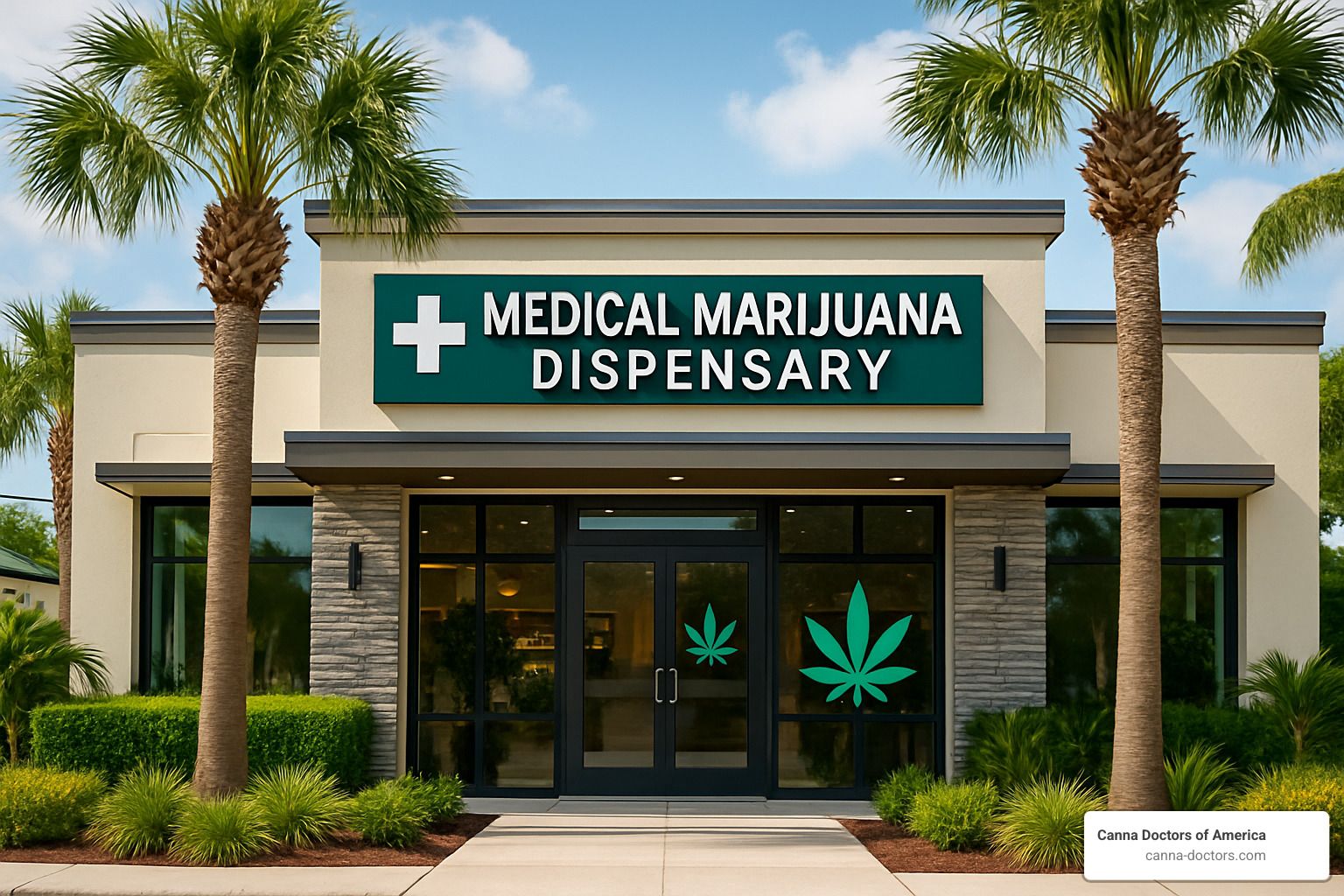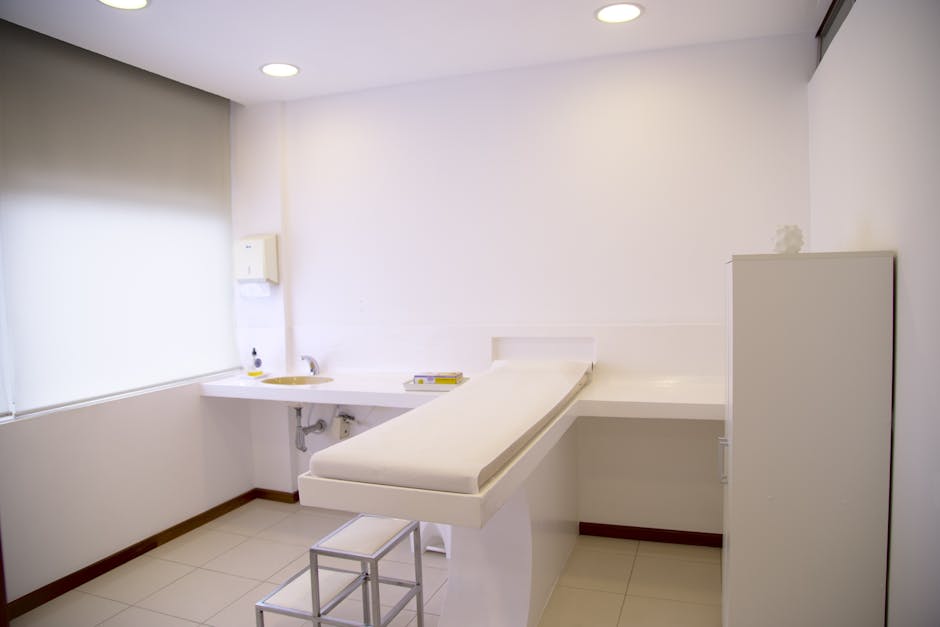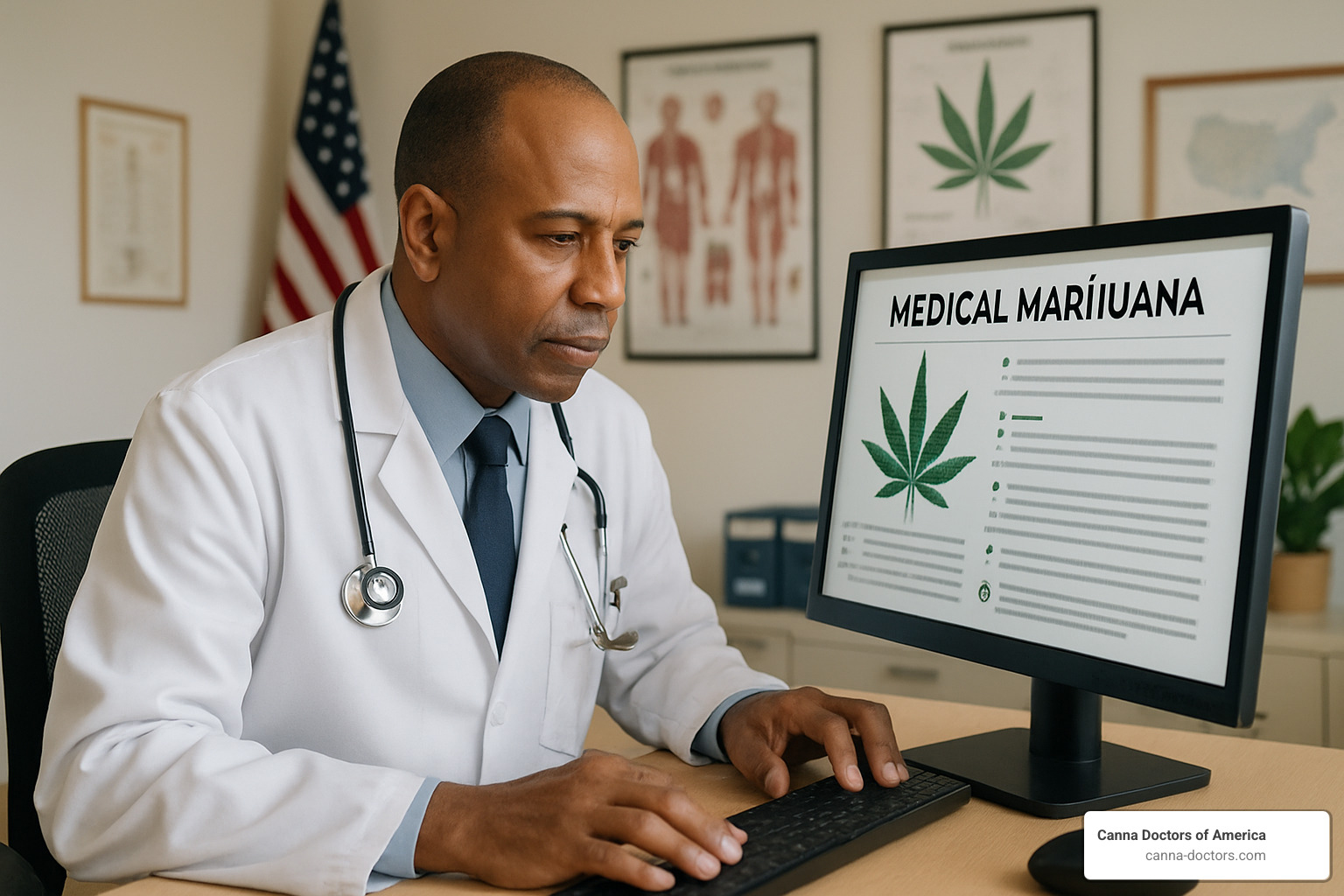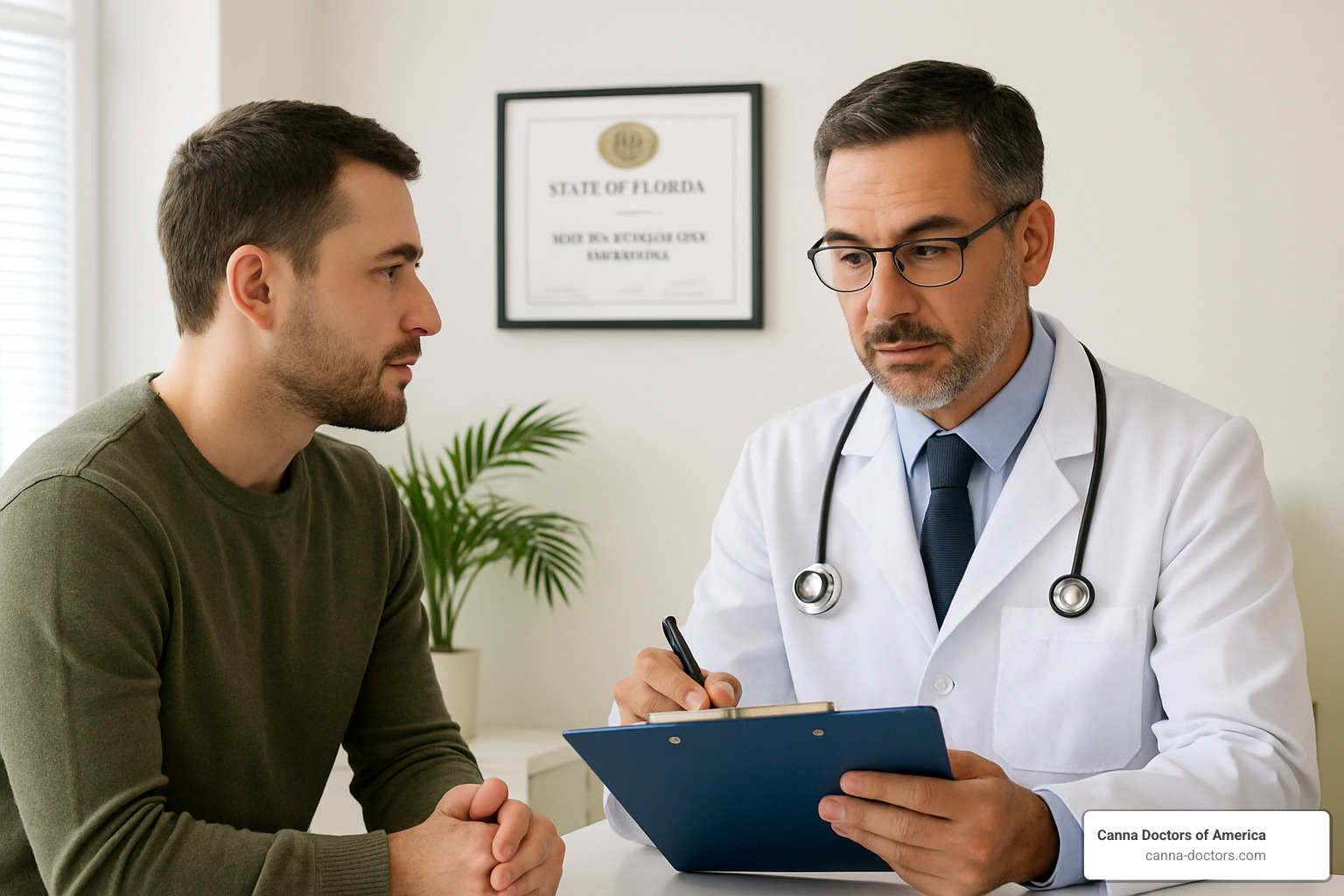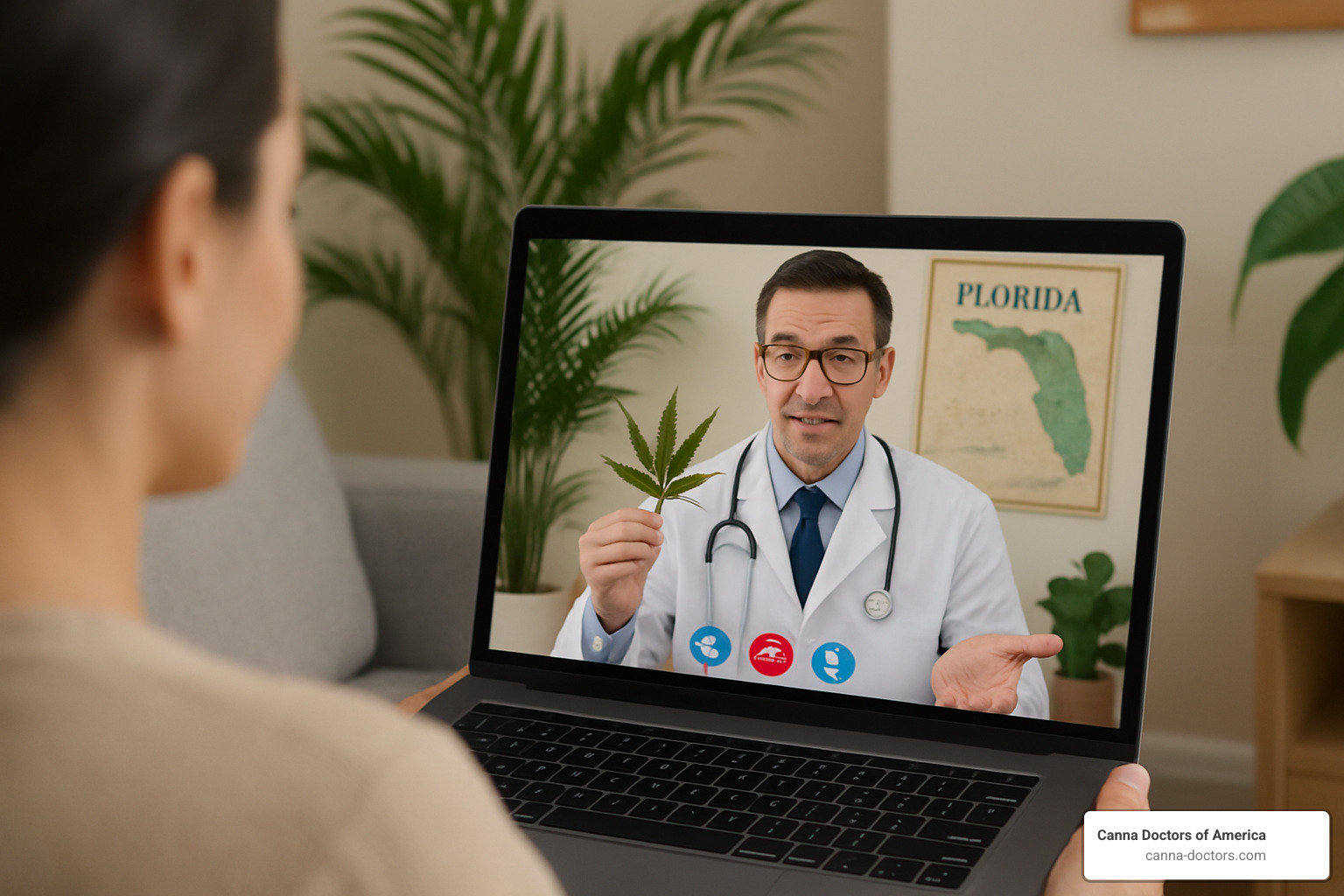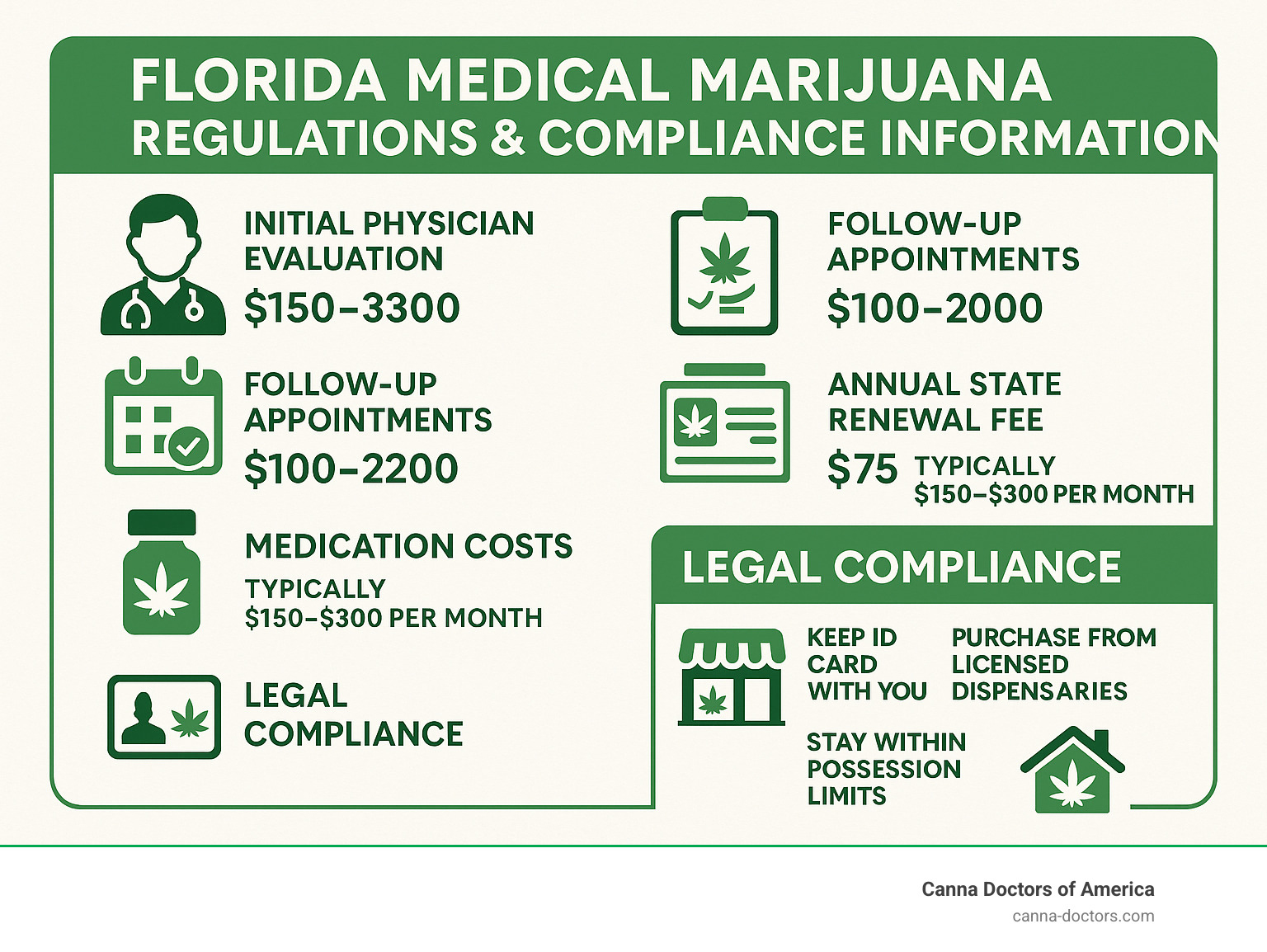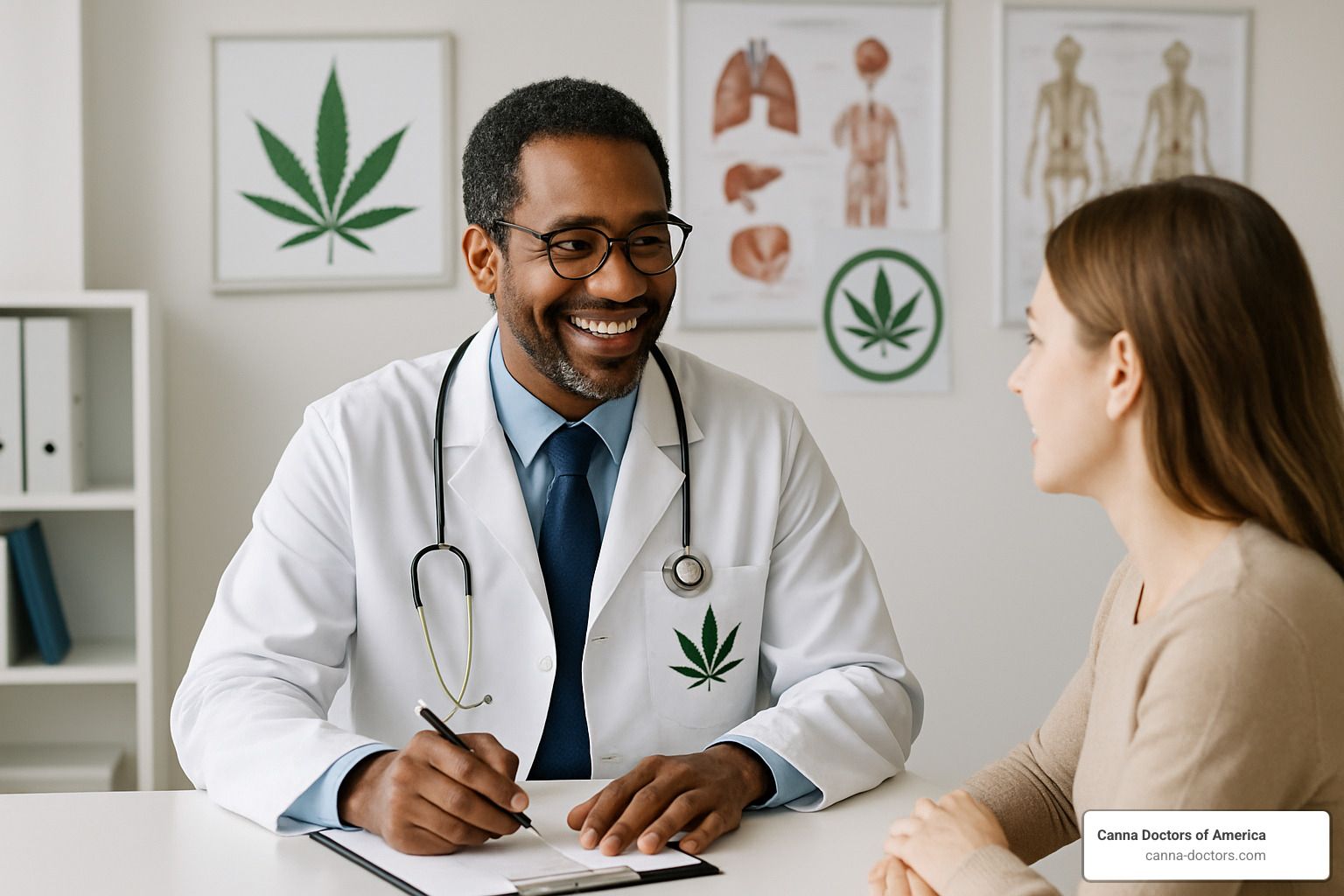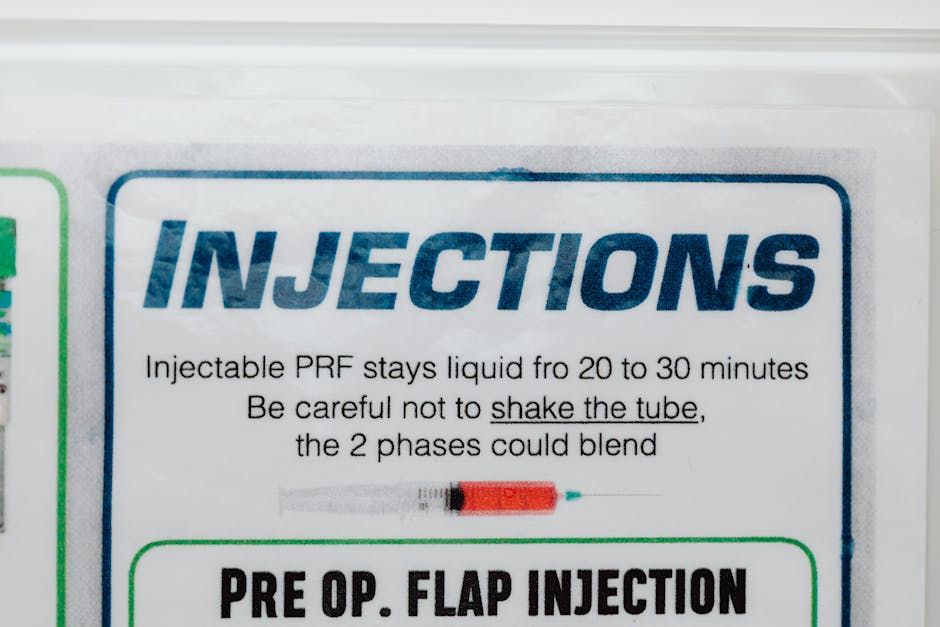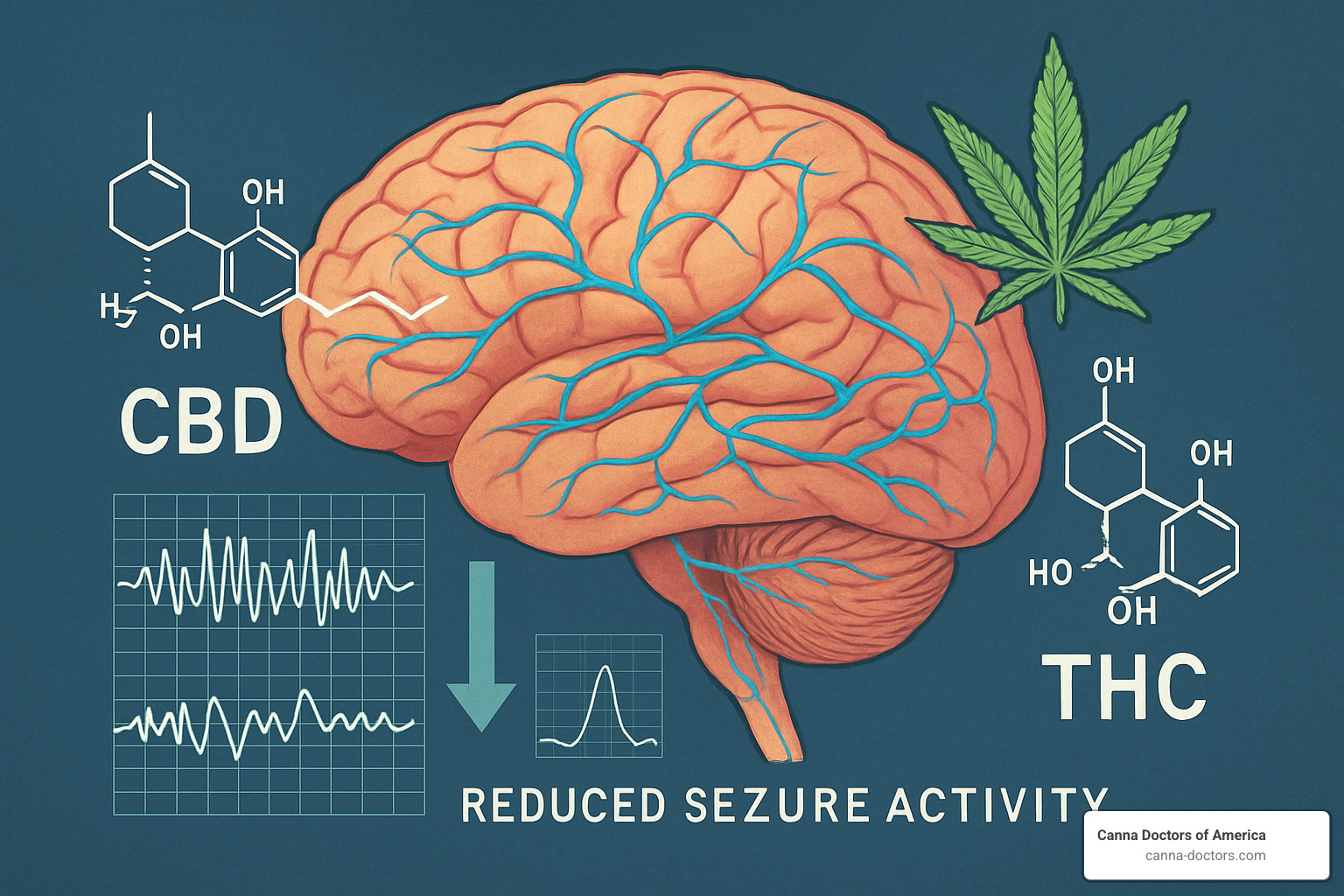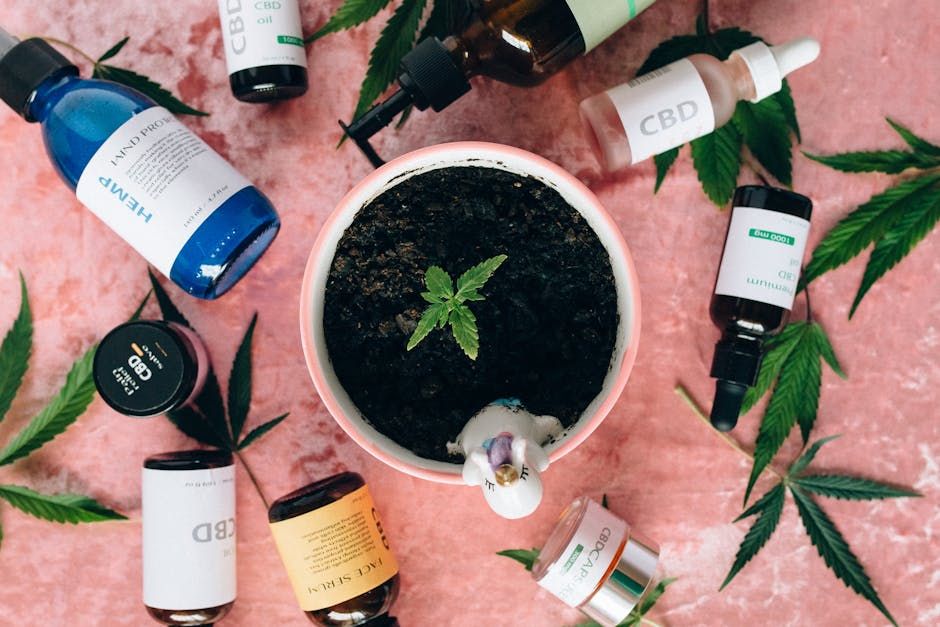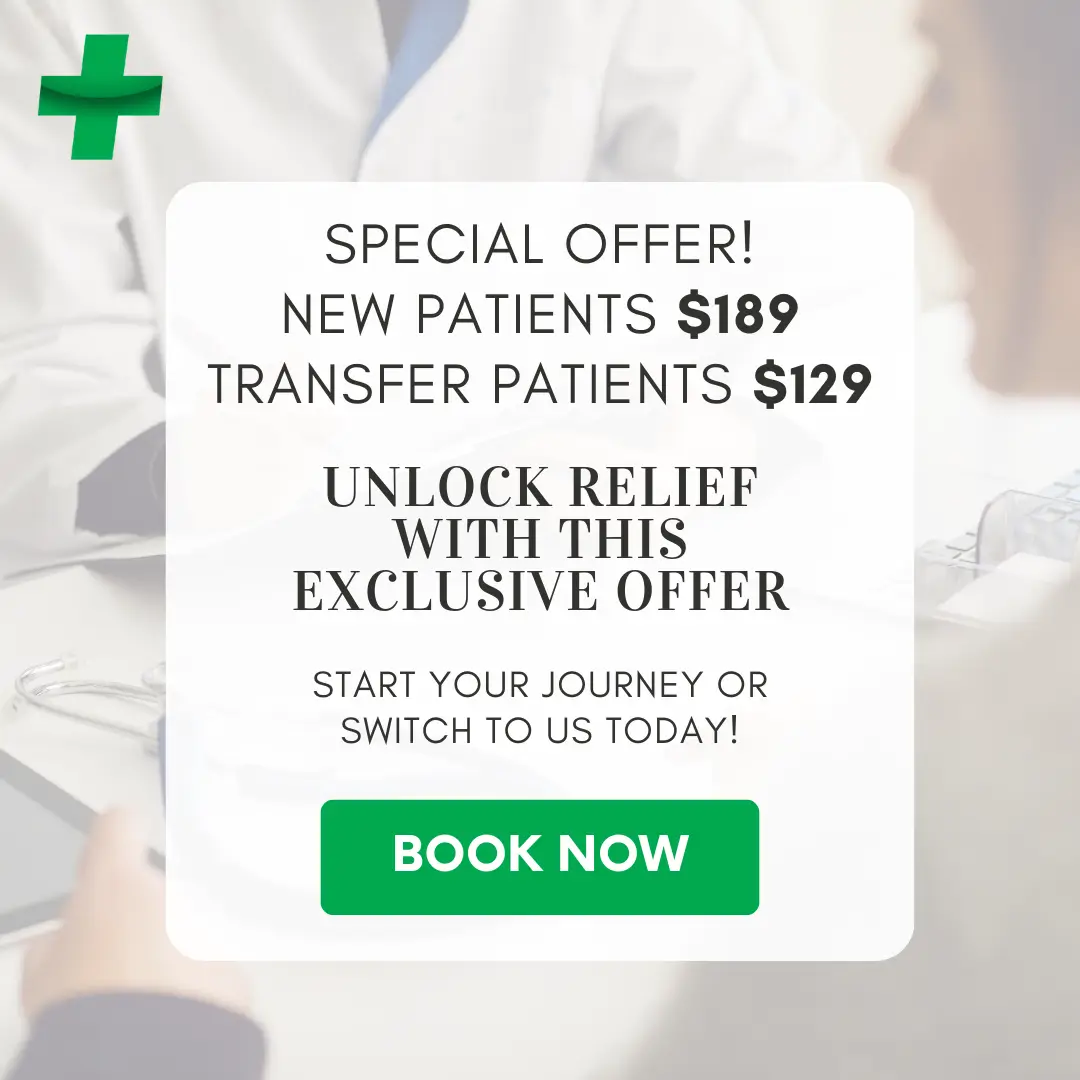Dispensary Dash—Florida’s Best Spots for Medical Marijuana
Navigating Florida’s Medical Marijuana Scene
Florida dispensary options have expanded dramatically since medical marijuana was legalized in 2016. If you’re looking for a licensed medical marijuana dispensary in Florida, here’s what you need to know:
- Requirements: Valid Florida Medical Marijuana Card and government-issued ID
- Dispensary availability: Several statewide retail chains now operate 50 – 140+ storefronts each, along with many independent locations
- Typical hours: 9:00 AM – 8:30 PM (Mon-Sat), reduced hours on Sundays
- Products available: Flower, concentrates, vapes, edibles, tinctures, topicals
- Payment methods: Cash and debit cards with PIN (no credit cards)
Florida’s medical marijuana program has transformed access to alternative medicine for thousands of patients seeking relief from chronic conditions. Unlike states with recreational programs, Florida maintains a strictly medical approach, requiring all patients to obtain certification from a qualified physician before making purchases at any dispensary. For full details on program rules and regulations, visit the state’s Office of Medical Marijuana Use.
The state’s dispensary landscape continues to grow, with over 600 locations now serving patients across urban centers and rural communities alike. Each dispensary offers a unique experience, product selection, and specialty services – from personalized consultations to home delivery options.
Most dispensaries operate seven days a week, though Sunday hours are typically shorter. First-time patients often receive substantial discounts, with many locations offering 50-60% off initial purchases and loyalty programs for returning customers.
I’m Geoff Massey, Regional Director of Canna Doctors of America, where I’ve helped thousands of patients steer the Florida dispensary landscape to find relief through medical cannabis. My work focuses on properly educating patients about the various products available at every Florida dispensary to match their specific medical needs.
Terms related to florida dispensary:
Why This Guide Matters
This comprehensive guide serves as your quick-reference roadmap to navigating Florida’s ever-expanding medical marijuana landscape. Whether you’re a first-time patient or a seasoned cardholder looking to explore new options, we’ve compiled the most up-to-date information on dispensaries throughout the state.
Our statewide scope ensures that patients from Pensacola to Key West can find relevant information about their local dispensary options. We understand that the search for the right florida dispensary can be overwhelming, especially with new locations opening regularly and product offerings constantly evolving.
This guide aims to simplify your journey by providing clear, actionable information about what to expect, how to prepare, and how to maximize your experience at any florida dispensary. We’ve included insights on everything from required documentation to money-saving strategies that can help you get the most value from your medical marijuana investment.
The 2024 Florida Dispensary Landscape
The medical marijuana scene in Florida has blossomed into something quite remarkable since those early days. Today, you’ll find over 600 florida dispensary locations dotting our sunshine state, from the panhandle to the Keys.
Take a look at the map and you’ll notice some interesting patterns. As you might expect, our urban hubs like Miami, Orlando, Tampa, and Jacksonville have the highest concentration of dispensaries. In some areas, you might find three or four locations within just a few miles of each other!
What’s truly encouraging, though, is how access has expanded into previously underserved communities. Many dispensaries have recognized that patients in smaller towns deserve convenient access too. This expansion means fewer Floridians have to make long drives just to get their medicine.
When you visit any florida dispensary, you’ll be working within the same purchase limits, no matter which one you choose. The state tracks everything through their registry system, allowing qualified patients to purchase up to a 70-day supply at once. If you’re using smokable flower, the limit is 2.5 ounces per 35-day period.
Despite all this growth, Florida’s market doesn’t appear to be slowing down. New dispensary chains continue to enter our state, while the established players keep opening additional locations and expanding their delivery zones. This is great news for patients who value both variety and convenience.
Research has confirmed what many patients already know – dispensary access has improved dramatically, but challenges remain. Some folks in rural areas still face significant travel times, which is why delivery services have become such a vital part of the ecosystem. According to research by NBC-2, the expansion of dispensaries has significantly improved patient access across the state.
Key Numbers Behind Every florida dispensary
The sheer scale of Florida’s dispensary network is pretty impressive when you break it down. The market leader has over 140 locations across the state. If you’ve ever wondered why you see their green logo so frequently, that’s why! Coming in second is another major provider with more than 70 dispensaries throughout Florida.
Most florida dispensary locations maintain fairly consistent hours, typically opening around 9:00 AM and closing at 8:30 PM Monday through Saturday. Sundays often have reduced hours, usually 10:00 AM to 6:00 PM, but it’s always smart to check before heading out.
Behind the scenes, these dispensaries are busy hubs of activity. Busier locations might serve over 1,000 patients in a single day! That’s a lot of people finding relief through medical cannabis.
For patients with limited mobility or severe conditions, Florida’s caregiver system is a true blessing. Registered caregivers can purchase and transport medical marijuana on behalf of qualified patients. Becoming a caregiver involves applying through the same registry system as patients and receiving their own identification card – a straightforward process designed to help those who need additional support.
Licensing & Oversight of a florida dispensary
Every florida dispensary operates under the watchful eye of the Office of Medical Marijuana Use (OMMU), a division of the Florida Department of Health. This isn’t light-touch regulation – it’s comprehensive oversight that ensures all products meet strict safety and quality standards.
The backbone of this regulatory framework is Florida’s seed-to-sale tracking system. Think of it as a digital passport that follows every cannabis product from the moment it’s planted until it reaches your hands. This system helps prevent diversion and ensures that only qualified patients receive medical marijuana products.
Independent testing labs are the unsung heroes of Florida’s program. Before any product can be sold to patients, these labs analyze it for:
- Cannabinoid profile and potency
- Terpene content
- Residual solvents
- Pesticides and heavy metals
- Microbial contaminants
- Moisture content (for flower)
If something doesn’t meet standards, it doesn’t make it to the shelves – it’s that simple. And if an issue is finded after products have been distributed, robust recall protocols kick in immediately. The OMMU can mandate a recall, and dispensaries must comply right away and notify any affected patients.
This rigorous oversight is one reason why Florida’s medical marijuana program has earned the trust of hundreds of thousands of patients. When you visit any florida dispensary, you can feel confident that what you’re purchasing has been thoroughly tested and tracked every step of the way.
How to Become a Patient & Shop Safely
Ready to visit your first florida dispensary? Not so fast! In Florida, you’ll need to become a qualified patient first. This process is straightforward, but there are important steps to follow before you can legally purchase medical cannabis.
Let’s start with qualifying conditions. Florida recognizes several medical conditions that make patients eligible for medical marijuana, including:
Cancer, epilepsy, glaucoma, HIV/AIDS, PTSD, ALS, Crohn’s disease, Parkinson’s disease, multiple sclerosis, terminal conditions, chronic nonmalignant pain, and other comparable medical conditions.
If you’re living with one of these conditions, your next move is booking an appointment with a certified physician. At Canna Doctors of America, our Tampa, St. Petersburg, and Clearwater physicians specialize in evaluating patients for medical marijuana eligibility – often providing same-day approval!
The application process follows a simple path: First, you’ll have your physician evaluation where the doctor will certify your qualifying condition. Next, they’ll register you in the Medical Marijuana Use Registry (MMUR). After that, you’ll submit your application to the state along with the $75 fee. Within 7-10 business days (though often sooner), you’ll receive approval.
Here’s the good news – you don’t have to wait for your physical card to arrive! Once you receive your approval email, you can visit any florida dispensary with that email and your government ID to make purchases.
Wondering exactly how long the whole process takes? Check out our detailed guide on how long to get your medical marijuana card.
Your privacy matters to us. All patient information is fully protected under HIPAA regulations, so you can feel confident that your medical information remains private throughout the process. The state does track purchasing limits through the registry system to ensure patients don’t exceed their allowed amounts.
What to Bring to a Florida Dispensary
Walking into a florida dispensary unprepared can lead to disappointment. Save yourself the headache by bringing these essentials every time:
Your Medical Marijuana Card (or approval email if your physical card hasn’t arrived) is absolutely non-negotiable. Pair this with a valid government-issued photo ID (like your Florida driver’s license). Since most dispensaries can’t accept credit cards due to federal banking restrictions, bring cash or a PIN-enabled debit card. Many patients qualify for discounts, so don’t forget documentation if you’re a veteran, senior, or have a disability.
First-time visitors might find it helpful to bring their physician recommendations. While not required, this information helps dispensary staff understand your specific needs and recommend appropriate products and dosages.
Many dispensaries have ATMs on-site, but they typically charge fees. Save yourself those extra dollars by bringing cash with you. For a complete pre-visit checklist, check out our detailed guide on what you need to bring to a Florida dispensary.
Traveling With Your Medicine
Got your medicine and wondering about the rules for taking it with you? Within Florida, you can transport your medication, but there are important guidelines to follow for staying legal.
Always keep your products in their original, sealed packaging from the dispensary – this is required by law. Your medical marijuana card and ID should be with you whenever you’re transporting any products. For car travel, it’s best to store products in your trunk or glove compartment, never in the passenger area where they’re easily accessible.
Airport travel gets tricky. Even though TSA isn’t specifically searching for marijuana, it remains federally illegal. Florida airports fall under federal jurisdiction, so bringing cannabis into these areas carries significant risk, even with your valid medical card.
As for crossing state lines – don’t do it. Florida doesn’t recognize medical marijuana cards from other states, and likewise, other states generally don’t recognize Florida cards. This means you can’t legally purchase at dispensaries in other states using your Florida card, nor can you bring your medication across state lines.
And it should go without saying, but never consume in public or while operating a vehicle. For more guidance on traveling with your medicine, read our comprehensive article on traveling with Florida medical marijuana.
Top Product Categories & What to Expect
Florida dispensaries offer a diverse range of product categories to accommodate different patient needs, preferences, and medical conditions. Understanding these options helps you make informed decisions about your treatment plan.
Flower
Cannabis flower remains the most popular product category in Florida. Available in various strains with different cannabinoid and terpene profiles, flower provides fast-acting relief through inhalation. Florida dispensaries typically categorize flower by:
- Indica (typically more relaxing)
- Sativa (typically more energizing)
- Hybrid (balanced effects)
- THC percentage (ranging from 10% to 30+%)
- CBD content (some strains offer balanced ratios)
- Terpene profiles (affecting aroma, flavor, and effects)
Concentrates
Concentrates offer potent cannabinoid delivery in various forms:
- Wax, shatter, and budder for dabbing
- Kief for adding to flower
- Rosin and live rosin (solventless extracts)
- RSO (Rick Simpson Oil) for oral or topical use
- Distillate for precision dosing
Vapes
Vaporizer products provide a discreet, convenient option:
- Disposable vape pens
- Cartridges (510-thread and proprietary)
- Pod systems
- All-in-one devices
- Live resin and distillate options
Edibles
Florida allows edibles with specific regulations:
- Maximum 10mg THC per serving
- Maximum 200mg THC per package
- Available as gummies, chocolates, baked goods, and more
- Onset typically takes 30-90 minutes
- Effects can last 4-8 hours
Topicals
For localized relief without psychoactive effects:
- Creams and lotions
- Balms and salves
- Transdermal patches
- Bath products
- Roll-on applications
Tinctures & Capsules
For precise dosing and longer-lasting effects:
- Various THC:CBD ratios
- Sublingual tinctures for faster absorption
- Capsules for consistent dosing
- Nano-emulsified options for improved bioavailability
| Product Type | Onset Time | Duration | Best For |
|---|---|---|---|
| Flower/Vapes | 1-5 minutes | 1-3 hours | Acute symptoms, fast relief |
| Concentrates | 1-5 minutes | 1-4 hours | Severe symptoms, experienced users |
| Edibles | 30-90 minutes | 4-8 hours | Long-lasting relief, sleep |
| Tinctures | 15-45 minutes | 3-6 hours | Controlled dosing, moderate duration |
| Topicals | 15-30 minutes | 2-4 hours | Localized pain, inflammation |
| Transdermal | 15-60 minutes | 6-12 hours | Extended relief, steady dosing |
Edibles 101 Inside a florida dispensary
Edibles have become increasingly popular in Florida dispensaries since their approval in 2020. These products offer precise dosing and longer-lasting effects compared to inhalation methods, making them ideal for patients seeking extended relief.
Florida’s regulations cap edible dosing at 10mg of THC per serving, with a maximum of 200mg per package. This standardization helps patients control their intake and prevents accidental overconsumption. Common edible formats include:
- Gummies in various flavors and formulations
- Chocolate bars and bites
- Hard candies and lozenges
- Baked goods (cookies, brownies)
- Drink additives and powders
When shopping for edibles, pay attention to the cannabinoid ratio. Some products offer pure THC, while others include CBD or minor cannabinoids for different therapeutic effects. Many patients prefer 1:1 THC:CBD ratios for balanced relief with reduced psychoactivity.
First-time edible users should start with a low dose (2.5-5mg) and wait at least two hours before considering additional consumption. Effects can take 30-90 minutes to begin and may last 4-8 hours, significantly longer than inhaled products.
For more detailed information about Florida’s edible options, check out our guide on what types of edibles you can buy in Florida.
Dosing & Methods Made Simple
Understanding different consumption methods and appropriate dosing is crucial for a positive experience with medical marijuana. Each administration route offers distinct advantages:
Inhalation (Smoking/Vaping)
- Fastest onset (1-5 minutes)
- Easier to titrate dosage
- Shorter duration (1-3 hours)
- Good for acute symptoms
Oral (Edibles/Capsules)
- Delayed onset (30-90 minutes)
- Longer duration (4-8 hours)
- More consistent effects
- Ideal for sleep and extended relief
Sublingual (Tinctures)
- Moderate onset (15-45 minutes)
- Medium duration (3-6 hours)
- Precise dosing with droppers
- Good balance of speed and duration
Transdermal (Patches/Creams)
- Localized or systemic effects
- Extended release options
- Non-psychoactive (topicals)
- Ideal for targeted relief
For new patients, we recommend starting with a low dose and gradually increasing until you achieve the desired effects. This approach, known as “titration,” helps minimize unwanted side effects while identifying your optimal therapeutic dose.
Average starting milligrams vary by product:
- Inhalation: 2-5mg THC per session
- Edibles: 2.5-5mg THC per dose
- Tinctures: 2-5mg THC per dose
- Topicals: Apply as needed to affected areas
For personalized guidance on dosing and methods, visit our detailed guide on Florida medical marijuana dosages and methods.
Finding the Right Dispensary Near You
With over 600 dispensaries scattered across Florida, finding your perfect match can feel like searching for a needle in a haystack. But don’t worry – several helpful tools make this process much simpler for patients.
Most major florida dispensary chains offer user-friendly store locators on their websites. Just enter your zip code, and voilà – you’ll see a list of the closest locations, complete with driving distances. If you prefer a more comprehensive approach, platforms like Leafly and Weedmaps provide detailed directories that include user reviews, current product menus, and any special promotions happening now.
The good news for patients with mobility challenges or those living in more remote areas? Delivery zones have expanded dramatically in recent years. Many florida dispensary locations now offer home delivery within a 50-mile radius or more – a genuine game-changer for those who can’t easily visit in person. Delivery policies vary, but many dispensaries waive fees for orders above a certain amount, typically $100-150.
First-time patient deals are where the real savings begin. These welcome offers can be remarkably generous, often ranging from 30-60% off your initial purchase. Many dispensaries offer substantial discounts on first visits, with some extending these savings across multiple visits – giving you discounts on your first trip and special deals on your second or third visits.
Veterans, seniors, and those facing financial challenges should always ask about special status discounts. Most florida dispensary locations offer veterans a substantial discount, seniors typically receive 10-15% off, and SNAP/EBT recipients can save 10-20% on their purchases. These discounts acknowledge the importance of making medical cannabis accessible to those who need it most.
Tech-savvy patients will appreciate the rewards apps now standard at most major dispensaries. These digital loyalty programs typically award one point per dollar spent, with various redemption options becoming available as you accumulate points. It’s essentially free money for medicine you’d be purchasing anyway!
ADA accessibility is a priority throughout Florida’s dispensary network. Most locations feature wheelchair ramps, wide doorways, and accessible counters. If you have specific accessibility needs, a quick phone call before your visit can ensure the location is prepared to accommodate you properly.
Evaluating Quality at Any florida dispensary
Not all cannabis products are created equal. Learning to evaluate quality ensures you’re getting effective medicine for your condition, not just whatever happens to be on sale that day.
Certificate of Analysis (COA) Labels should be your first quality checkpoint. Every product sold in a florida dispensary must have a corresponding COA showing detailed test results. These documents reveal the cannabinoid potency, terpene content, and confirm the product passed testing for contaminants like pesticides, heavy metals, and microbials.
Quality-focused dispensaries make these easy to access – often through QR codes on packaging. If you don’t see this information readily available, always ask to see the COA. A good dispensary will happily provide it.
The terpene profile of your products matters tremendously for therapeutic effects. When evaluating products, look for detailed terpene percentages and a list of dominant terpenes. Generally, higher total terpene content in flower indicates better quality and more pronounced effects. Also, note whether products contain natural cannabis-derived terpenes or added botanical terpenes, as this can impact your experience.
When examining flower appearance, quality cannabis typically shows proper trimming with minimal leaf material, visible trichome coverage (those tiny crystal-like structures), and appropriate moisture content. The flower shouldn’t feel too dry and crumbly or too moist and spongy. Natural coloration and aroma, along with a proper cure that produces smooth smoke or vapor, are also indicators of quality cultivation.
Perhaps surprisingly, staff education is one of the best indicators of a quality florida dispensary. Knowledgeable staff should be able to make recommendations based on your specific conditions, understand the nuances of cannabinoid and terpene effects, and demonstrate familiarity with different consumption methods. They should take a patient-focused approach rather than pushing whatever has the highest profit margin. Good budtenders will even admit when they don’t know something and take the time to find accurate information.
While subjective, patient reviews often reveal patterns worth noting. Look for consistent feedback about product quality, staff knowledge, wait times, menu accuracy, and how the dispensary handles any issues that arise. A few negative reviews are normal for any business, but patterns of complaints about specific issues should raise red flags.
Money-Saving Hacks & Loyalty Programs
Medical marijuana represents a significant investment in your health, but several strategies can help stretch your budget at any florida dispensary without compromising on quality.
Stackable deals are the secret weapon of savvy cannabis patients. Many dispensaries allow combining different discount types – like using a veteran discount during a storewide promotion or applying reward points to already-discounted items. Policies vary widely, so always ask what combinations are allowed. Sometimes a friendly budtender might bend the rules slightly for patients they know are on tight budgets.
BOGO (Buy One, Get One) offers provide exceptional value, especially for patients who can afford to stock up when these deals appear. These promotions come in several forms: completely free second items (BOGO Free), half-price second items (BOGO 50%), or fixed-price second items (BOGO $X). Watch for these deals on your preferred products and plan your purchases accordingly.
Many dispensaries offer happy hour and flash sales during specific timeframes. Early bird specials typically run from opening until mid-morning (9-11 AM), while some locations offer late-night discounts during the final hours before closing. Flash sales announced via social media or text alerts can offer substantial savings but require quick action. Major cannabis holidays like “Green Wednesday” (the day before Thanksgiving) and “Green Friday” feature some of the year’s best promotions.
Don’t overlook renewal credits when it’s time to renew your medical marijuana card. Several dispensaries offer special discounts at this milestone – many provide substantial discounts on purchases when you renew. These offers help offset your annual physician recertification and state renewal fees.
For helpful tips on tracking your recommendation expiration dates to maximize these renewal offers, check out our guide on how to find out when your medical marijuana orders expire online.
Frequently Asked Questions about Florida Medical Marijuana Dispensaries
How much cannabis can I legally carry?
When you become a medical marijuana patient in Florida, the state sets clear limits on how much cannabis you can legally possess at any time.
For smokable flower, you’re allowed to purchase and possess up to 2.5 ounces during each 35-day period. For all other products (like vapes, tinctures, and edibles), you can have up to a 70-day supply as determined by your doctor during your certification appointment.
These limits apply whether you’re at home or traveling within Florida’s borders. It’s important to stay within these amounts because exceeding them could lead to legal issues, even with your valid medical card.
Don’t worry about accidentally buying too much – Florida’s tracking system monitors all your purchases across every florida dispensary to prevent you from exceeding your recommendation. Each purchase gets automatically deducted from your available amount in the state registry.
If you’re curious about the specifics of possession limits or have questions about traveling with your medicine, check out our detailed guide on how much medical cannabis someone can carry on their person.
Do seasonal residents qualify for a card?
Good news for snowbirds and part-time Florida residents – yes, you can qualify for a Florida medical marijuana card even if you don’t live here year-round!
Florida’s medical marijuana program welcomes “seasonal residents” who:
- Live in Florida for at least 31 consecutive days each year
- Maintain a temporary Florida residence
- Return to their home state at least once annually
- Remain registered to vote or pay income tax in another state
When applying as a seasonal resident, you’ll need to provide proof of your temporary Florida address. This could be a utility bill showing your Florida address, a property tax receipt, a residential lease agreement, or even mail from a financial institution or government agency sent to your Florida home.
The application process works exactly the same as it does for permanent residents – you’ll still need to meet with a certified physician like those at Canna Doctors of America, register with the state, and pay the standard application fee. The only difference is providing that additional documentation to verify your seasonal status.
Are dispensaries open on Sundays?
Yes, most florida dispensary locations do open their doors on Sundays, though typically with shorter hours than the rest of the week. While Monday through Saturday you’ll generally find dispensaries operating from 9:00 AM until 8:30 PM, Sunday hours often run from around 10:00 AM to 6:00 PM instead.
I always recommend checking before making a Sunday dispensary trip. Some smaller locations or those in certain municipalities might be closed completely on Sundays due to local rules or staffing limitations. A quick phone call or check of the dispensary’s website can save you an unnecessary trip.
Most florida dispensary websites now feature real-time inventory updates, which is particularly helpful for Sunday shopping when products might be running low after a busy weekend. This lets you confirm that your preferred items are in stock before heading out.
If you’re planning a Sunday visit to stock up on medicine, it’s worth calling ahead or checking online – not just for hours, but also to see if they’re running any special Sunday promotions. Some dispensaries offer “Sunday Funday” deals to drive traffic during traditionally slower hours!
Conclusion
Finding your way through Florida’s medical marijuana landscape is much easier when you have the right information in your back pocket. With all the florida dispensary options now available across the Sunshine State, you have more choices than ever to find relief that works for your specific needs.
At Canna Doctors of America, we’ve built our practice around making this journey simpler for you. We’re not just another medical office – we’re your partners in accessing the natural medicine that could significantly improve your quality of life. Our compassionate physicians in Tampa, St. Petersburg, and Clearwater specialize in providing the personalized guidance you deserve.
Getting your medical marijuana card shouldn’t feel like navigating a maze. That’s why we’ve streamlined everything into three simple steps:
- Schedule your appointment online or with a quick phone call
- Meet with our friendly, certified physician for your evaluation
- Receive same-day approval and start shopping at any florida dispensary right away
Whether you’re just beginning to explore medical marijuana or it’s time to renew your existing card, we’re here to answer all your questions without judgment. Our goal is to make sure you feel confident and informed about your options – from understanding different product types to knowing what to expect at your local dispensary.
The world of medical cannabis in Florida continues to grow and evolve. New products appear on dispensary shelves regularly, research uncovers new benefits, and the patient experience keeps improving. By staying connected with knowledgeable healthcare providers who truly care about your wellbeing, you can steer this changing landscape with confidence.
Ready to take the next step? Visit our Tampa clinic information page to learn more about our services or reach out directly to our Tampa, St. Petersburg, or Clearwater locations. We’re here to help you access the relief you deserve – without the hassle, confusion, or long waiting periods you might expect elsewhere.
Your journey to natural relief starts with a single step. Let’s take it together.
